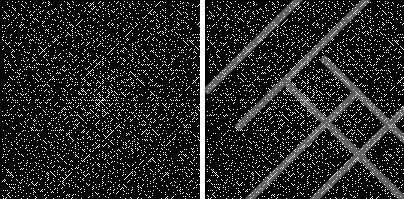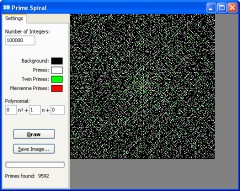or What America is in Danger of Becoming
Apparently several disgruntled fundamentalist christians have set up their own “alternative” to Wikipedia that they’re calling Conservapedia (subtitled “A conservative encyclopedia you can trust“). Their biggest gripes with Wikipedia appear to be their perception of a “liberal bias” in Wikipedia, as well as Wikipedia’s use of C.E. (Common Era) in dates instead of A.D. (Anno Domini). In short, the authors of Conservapedia fear that Wikipedia is becoming “increasingly anti-Christian and anti-American.”
No doubt, Conservapedia was founded by a couple of angry guys whose edits on Wikipedia got deleted for being too preachy and uncomfortably fundamentalist. The guys may have even been cranky enough to get banned from Wikipedia altogether, which is what probably gave them the bright idea to start their own encyclopedia, so that subsequent generations of fundies can be as ignorant and hypocritical as they are.
After a few minutes of browsing Conservapedia, it becomes clear that 90% of its articles are one-liners (these are articles where the authors don’t care to make a political statement). All of Conservapedia’s articles on Biology, Chemistry, and Physics are one sentence long, and appear to come from a series of textbooks by Jay L. Wile, a conservative christian author whose books urge their readers to study science, but only while wearing the dunce-cap of biblical inerrancy and basking in the glory of the lord-our-god.
In the articles where it does attempt to make a statement (that is, articles that are longer than one sentence), Conservapedia offers us nothing more than the usual regurgitations of creationist arguments that have long been discredited and put to rest. These include old-time favorites like “no transitional fossils,” “irreducible complexity,” and other arguments favored by creationist all-stars like Kent Hovind and Ken Ham.
What really disturbs me is the mind-boggling hypocrisy of Conservapedia. The authors complain that Wikipedia has a “liberal bias,” and that its editors regularly edit articles to have a decidedly “anti-christian” tone. This is certainly not true, but we’ll come back to that. The point is, even if Wikipedia displays some kind of bias, it’s blatantly obvious that the bias seen in Conservapedia is vastly greater! We can guess with some certainty what would happen when someone adds content to Conservapedia that doesn’t conform exactly to their infallible beliefs.
Conservapedia actually has a page that lists all of the purported “examples of bias in Wikipedia.” My first thought was, “What credible encyclopedia goes out of its way to show how it’s better than other encyclopedias?” My second thought was even better: “An article entitled ‘Examples of bias in Conservapedia’ would pretty much contain the entire website!”
Wikipedia is not anti-christian. It is, by definition, not biased at all. If a certain article appears to have an “anti-christian” tone, it is precisely because the editors removed a pro-christian bias from the article.
I agree that Truth is not a democracy. However, there is such a thing as scientific consensus. Many of the people who edit Wikipedia articles are experts in their respective fields, like biology, chemistry, physics, and history. These people are qualified to represent the current scientific consensus on various matters, including evolution, origins of the universe, abortion, gay marriage, Christianity’s influence in the Renaissance, etc. (These are all subjects that the Conservapedia authors have a hard-on for disputing).
Religious rants from fundamentalists belong in personal web pages and blogs (of which there’s no shortage, I assure you), or better yet, stored away safely in the minds of religious fanatics. They certainly don’t belong on websites that claim to be a source of actual information for the general public.
Looking at Conservapedia, I can see many disturbing parallels between it and the current state of affairs in the United States. It is exactly this kind of thinking, this kind of hypocrisy and ignorance, that will eventually revert this free and enlightened nation to a 15th-century theocracy where atheists and any other non-christians will be burned at the stake once more. Of course I’m exaggerating, and I’m by no means fearful for my life at this point, but I do get a chill down my spine when I see yet another website showing that such beliefs still exist in the 21st century.
… unless the whole thing is a hoax, in which case, well-played!
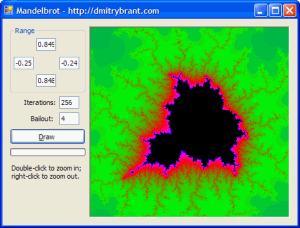

 However, tessellations are also possible on non-Euclidean spaces, such as the elliptic plane (like the stitching pattern on a soccer ball), and the hyperbolic plane (like… nothing you’d find around the house). In fact, the Euclidean plane has only three regular tessellations (with squares, hexagons, and triangles), while the hyperbolic plane can be tessellated in infinitely many ways.
However, tessellations are also possible on non-Euclidean spaces, such as the elliptic plane (like the stitching pattern on a soccer ball), and the hyperbolic plane (like… nothing you’d find around the house). In fact, the Euclidean plane has only three regular tessellations (with squares, hexagons, and triangles), while the hyperbolic plane can be tessellated in infinitely many ways.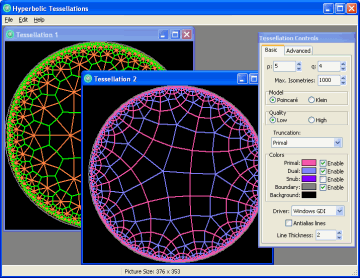
 The “Tessellation Controls” window allows you to change the settings for the tessellation that is currently active.
The “Tessellation Controls” window allows you to change the settings for the tessellation that is currently active.





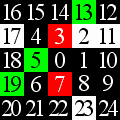 However, prime numbers do exhibit a curious
However, prime numbers do exhibit a curious 